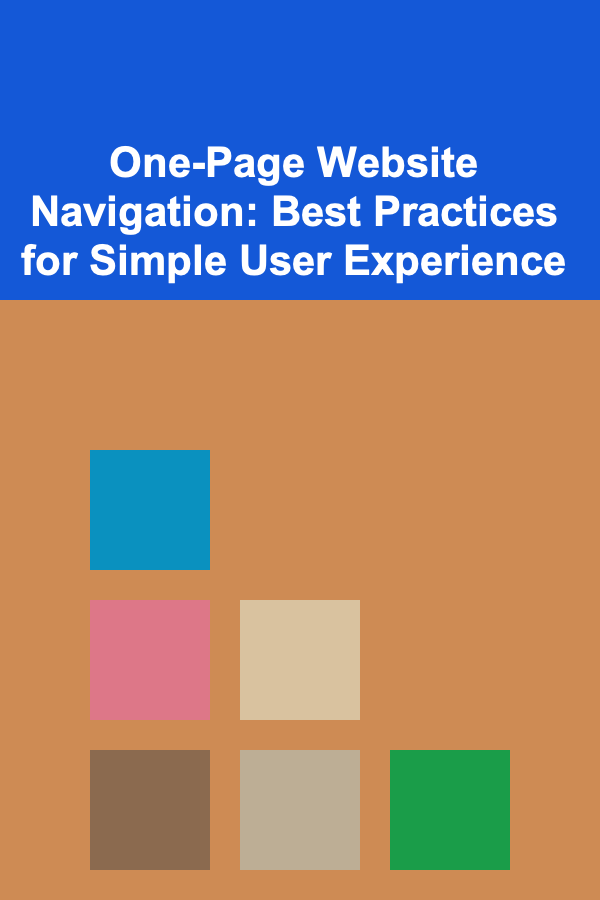
How to Make Money Online as a Teacher: 10 Actionable Ideas
ebook include PDF & Audio bundle (Micro Guide)
$12.99$6.99
Limited Time Offer! Order within the next:

The rapid growth of online education has created a wealth of opportunities for teachers to make money online. Whether you're a classroom teacher, an academic tutor, or a subject expert, there are numerous ways to monetize your expertise from the comfort of your home. This article will explore ten actionable ideas for making money online as a teacher, focusing on practical steps and tips for success.
Offer Private Tutoring Services
Private tutoring has always been a popular way for teachers to supplement their income. With the rise of online platforms, you can now offer tutoring services to students worldwide, across a variety of subjects.
How to Get Started:
- Choose a subject area: Identify which subjects you are most proficient in and passionate about. Consider whether you want to focus on elementary, high school, or college-level tutoring, and whether you'll tutor in languages, math, science, or any other field.
- Use online platforms : Websites like Chegg, Wyzant, Tutor.com, and Preply provide platforms to connect tutors with students. You can set your own rates, schedule, and work with students one-on-one.
- Create a tutoring profile: When you sign up for these platforms, make sure your profile stands out. Include your qualifications, teaching experience, and testimonials from past students if possible.
Tips for Success:
- Specialize: Instead of offering general tutoring, specialize in a niche area that has high demand (e.g., SAT preparation, ESL, or advanced calculus).
- Build relationships: Positive word-of-mouth is critical for getting repeat students. Build strong, supportive relationships with your clients to encourage long-term engagement.
- Use technology: Leverage tools like virtual whiteboards, video lessons, and screen sharing to enhance the learning experience for your students.
Create and Sell Online Courses
As a teacher, you likely have a wealth of knowledge that can be packaged into an online course. Creating and selling courses is one of the most profitable ways to make money online, as it allows you to reach a large audience and generate passive income.
How to Get Started:
- Identify your niche: Think about what subjects you teach best and which topics your audience may be interested in learning more about. For example, if you're a history teacher, you could create a course on "The World Wars" or "The History of Ancient Civilizations."
- Use course platforms: Websites like Udemy, Teachable, Thinkific, and Skillshare offer easy-to-use platforms for creating and selling online courses. These platforms provide tools for building and marketing your courses.
- Create course content: Design your course materials, which could include video lessons, quizzes, assignments, and downloadable resources. Aim for high-quality content that's engaging and interactive.
Tips for Success:
- Offer free content: To attract potential students, create free previews or mini-courses that give them a taste of your teaching style and the value of your courses.
- Focus on course quality: High-quality, well-organized courses are more likely to attract positive reviews and repeat customers.
- Promote your courses: Use social media, email newsletters, and blogs to market your courses. Offering special promotions or discounts can also increase course enrollments.
Start a YouTube Channel
YouTube is one of the most popular platforms for sharing educational content, and it offers an excellent opportunity for teachers to monetize their knowledge. With millions of people watching educational videos every day, there is immense potential for teachers to grow an online presence.
How to Get Started:
- Choose a niche: Decide on the specific subject or teaching style you want to focus on. Popular niches include English grammar, mathematics, coding tutorials, or life skills.
- Create educational content: Develop high-quality, engaging videos that provide valuable information. These could be lecture-style videos, tutorial lessons, or problem-solving demonstrations.
- Monetize your channel: Once you've gained a decent following, you can apply for YouTube's Partner Program, which will allow you to earn money through ad revenue. You can also monetize your videos through sponsored content, affiliate links, and selling your own products or courses.
Tips for Success:
- Consistency is key: Regular uploads help build a loyal audience. Consider posting new videos weekly or bi-weekly.
- Engage with your audience: Respond to comments, ask for feedback, and encourage viewers to subscribe to your channel. Building a community around your content can help increase engagement.
- Optimize for SEO: Use search engine optimization (SEO) techniques by including relevant keywords in your video titles, descriptions, and tags. This will make your videos more discoverable on YouTube.
Write and Sell Educational E-books
If you have a talent for writing, you can write and sell educational e-books on topics within your area of expertise. E-books are an affordable and convenient way for students to access valuable information, and they can be sold on a variety of platforms.
How to Get Started:
- Choose a topic: Identify a subject or topic that you're knowledgeable about and that has market demand. For example, you could write a guide to passing a specific exam or a textbook for a particular subject.
- Write the e-book: Organize your material into chapters, ensuring it's well-structured and easy to follow. Include relevant images, examples, and explanations to enhance the learning experience.
- Publish and sell: Publish your e-book on platforms like Amazon Kindle Direct Publishing (KDP), Gumroad, or your website. You can also sell it through educational marketplaces like Teachers Pay Teachers.
Tips for Success:
- Focus on clarity and conciseness: Write in a clear, easy-to-understand manner, and avoid jargon unless necessary.
- Offer supplementary materials: Enhance the value of your e-book by including bonus content, such as worksheets, templates, or quizzes.
- Market your e-book: Promote your e-book on social media, through your blog, or by collaborating with other educators who can share it with their audience.
Sell Lesson Plans and Teaching Resources
Many teachers struggle to find high-quality lesson plans and teaching resources, which makes this an ideal area for teachers to monetize their work. By creating and selling your lesson plans, worksheets, and other teaching materials, you can help other teachers while earning money.
How to Get Started:
- Create valuable resources: Develop lesson plans, activities, quizzes, and worksheets that other teachers would find useful. These could be subject-specific or cater to a particular grade level.
- Use online marketplaces: Websites like Teachers Pay Teachers and Etsy allow you to sell your teaching resources directly to other educators. You can set your own prices and retain full control over your materials.
- Market your resources: Promote your products on social media, educational forums, and teacher communities to increase sales.
Tips for Success:
- Focus on quality: Teachers are more likely to buy resources that are well-organized, detailed, and easy to implement in the classroom.
- Bundle your resources: Create resource bundles or packages that offer multiple lesson plans or materials at a discounted price. This can increase the perceived value of your products.
- Get feedback: Encourage teachers to leave reviews or feedback on your resources. Positive reviews will help build credibility and attract more buyers.
Become an Online Course Instructor
If you are an expert in a particular field, becoming an instructor for an established online course provider can be a lucrative option. Websites like Coursera, edX, and LinkedIn Learning allow teachers to design and teach courses for a global audience.
How to Get Started:
- Choose a platform: Research different platforms to find one that aligns with your expertise and teaching style. Some platforms allow you to create a course from scratch, while others may require you to apply as an instructor for existing course topics.
- Design your course: Similar to creating your own online course, you'll need to develop lessons, assignments, and any other materials. Focus on delivering high-quality content that meets the platform's standards.
- Set your pricing: Some platforms offer a fixed pay per course, while others allow you to set your own rates. Understand the payment structure before committing.
Tips for Success:
- Understand the platform's audience: Different platforms cater to different types of learners. Ensure your course aligns with the needs and expectations of the platform's audience.
- Leverage existing content: If you've already created content (such as lesson plans or video tutorials), repurpose it for these platforms to save time.
- Market your course: Although these platforms provide visibility, promoting your course through social media and email marketing can help increase enrollment.
Host Paid Webinars and Workshops
Webinars and workshops are a great way to offer specialized knowledge to a focused group of people. By charging for access, you can turn these sessions into a profitable income stream.
How to Get Started:
- Choose a relevant topic: Pick a topic that appeals to your target audience. For example, if you're a math teacher, you might host a workshop on "Advanced Calculus Techniques" or "Math Test Preparation."
- Select a webinar platform: Use platforms like Zoom, WebinarJam, or GoToWebinar to host your live sessions. These platforms offer tools for managing attendees, collecting payments, and delivering content.
- Market your webinar: Promote your webinar on social media, educational blogs, and through email newsletters. You could also offer early-bird discounts to encourage sign-ups.
Tips for Success:
- Offer valuable content: Ensure your webinars provide real value to attendees. Offer actionable advice, tips, or strategies they can apply in their own studies or classrooms.
- Keep sessions interactive: Encourage participation through Q&A sessions, polls, or group discussions to keep your audience engaged.
- Follow up: After the webinar, offer attendees access to recorded content or additional resources to help solidify their learning.
Develop a Subscription-Based Membership Community
Creating a membership community can be a profitable and sustainable way to generate online income as a teacher. You can offer exclusive content, one-on-one consultations, or group coaching sessions to a select group of members who pay a recurring subscription fee.
How to Get Started:
- Choose a platform: Use platforms like Patreon, Substack, or even your own website to host your membership community.
- Offer exclusive content: Provide members with access to exclusive lessons, tutorials, or resources that aren't available to the general public.
- Engage with your community: Foster a sense of community by regularly engaging with members through live chats, forums, or special events.
Tips for Success:
- Offer tiered memberships: Create different membership levels with varying benefits, such as one-on-one coaching for higher-tier members.
- Consistent value: Ensure you're consistently delivering value to your members to keep them engaged and subscribed.
- Promote your community: Use social media and other platforms to advertise your membership community and the benefits of joining.
Become an Educational Consultant
As an experienced teacher, you can leverage your expertise to offer consulting services to schools, educational institutions, or individual teachers who need guidance on curriculum development, teaching strategies, or classroom management.
How to Get Started:
- Identify your area of expertise: Whether it's curriculum design, educational technology, or teacher training, define your specialty.
- Create a consulting portfolio: Develop a professional website or portfolio showcasing your services, case studies, and testimonials.
- Network with potential clients: Reach out to schools, educational organizations, and other institutions to offer your services. You can also use LinkedIn and other platforms to connect with potential clients.
Tips for Success:
- Market your services: Use your online presence to showcase your expertise and attract potential clients.
- Offer workshops and training: Organize workshops or webinars for educators to demonstrate your consulting services and establish your credibility.
- Stay updated: Stay current on the latest trends in education to offer innovative and relevant advice to your clients.
Offer Educational Content through Blogging
Blogging can be an excellent way to share your teaching expertise while also making money online. As a teacher, you can write about educational topics, classroom strategies, or personal teaching experiences, attracting a wide audience of students, parents, and fellow educators.
How to Get Started:
- Choose a blog niche: Focus on an area where you have expertise and where there is demand for content. Popular blog topics for teachers include lesson planning, education technology, and teaching resources.
- Monetize your blog: You can make money through ads, affiliate marketing, sponsored content, or selling your own educational products (such as e-books, worksheets, or online courses).
- Promote your blog: Use social media, email marketing, and guest posting on other educational blogs to drive traffic to your site.
Tips for Success:
- Write engaging content: Offer helpful, informative, and actionable content that will keep your readers coming back.
- Optimize for SEO: Use search engine optimization strategies to ensure your blog ranks high in search engines, helping more people find your content.
- Diversify revenue streams: Don't rely solely on ads. Consider offering digital products, consulting services, or courses to diversify your income.
Conclusion
The opportunities for teachers to make money online are vast and diverse. Whether you want to offer tutoring services, create online courses, or monetize your content through blogging or YouTube, there are numerous ways to leverage your teaching expertise and build a sustainable online income. By choosing the methods that align with your skills and interests, you can create a rewarding online teaching business that allows you to reach a global audience and make a meaningful impact.

How to Create an Efficient Storage System for Your Tools and Hardware
Read More
How to Make Money Online as an Artist: 10 Actionable Ideas
Read More
How to Stage a Home to Sell During the Winter Season
Read More
One-Page Website Navigation: Best Practices for Simple User Experience
Read More
Supporting Teen Mental Health: A Comprehensive Guide
Read More
How to Surf with Style: Mastering Surf Etiquette
Read MoreOther Products

How to Create an Efficient Storage System for Your Tools and Hardware
Read More
How to Make Money Online as an Artist: 10 Actionable Ideas
Read More
How to Stage a Home to Sell During the Winter Season
Read More
One-Page Website Navigation: Best Practices for Simple User Experience
Read More
Supporting Teen Mental Health: A Comprehensive Guide
Read More